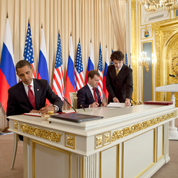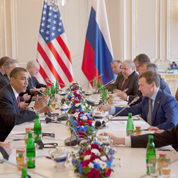The new START: its objectives and implications for bilateral and global affairs

Whatever the outcomes of the fate of the new Strategic Arms Reduction Treaty (START) in the Russian State Duma and U.S. Senate, the Czech Republic’s capital city of Prague and April 8, 2009, where and when the long-awaited accord was finally penned by Barack Obama and Dmitry Medvedev, will certainly go down in world history as the venue and date of the final legalization of the first major breakthrough in the freshly ‘reset’ U.S.-Russian strategic relations in nuclear and other broader issues of bilateral and geopolitical importance.
Besides, the date and the city will also henceforth be referred to not only as the new starting point in the two great nations’ bilateral ties, but also the day and occasion, where common sense, pragmatic diplomacy and the urgent need for strengthening the foundation of today’s collective global security took precedence over the questionable policies of unilateralism and the radical zero-sum equation and confrontational behavior by the previous U.S. administration that have governed the two nuclear superpowers’ relationships in international politics over the past eight years.
Despite the difficult ratification tasks ahead, the two sides and independent experts have conceded that the new treaty is a win-win situation for Moscow and Washington. “One of the most visible implications of the treaty is that it has reaffirmed Moscow’s status as a global great power, a position strongly debated by President George Bush Jnr.’s administration, as well as introduced strategic stability and parity with the United States on nuclear issues,” said Marcin Kaczmarsky, an analyst in the Russian Department of the Center for Eastern Studies at University of Warsaw’s Institute of International Relations. Though the treaty is unlikely to generate immediate positive spill-over effects that will readily transform current U.S.-Russian relations, it is largely expected the penning of the historic agreement will open new avenues for seeking compromises on other thorny issues on the two nations’ bilateral agenda.
The road to the Prague treaty signing ceremony
Moscow had waited a long time to see the dawn of this day as the President George Bush, Jnr’s administration did not see the issue of a potential nuclear parity pact with Russia a as top priority among his foreign policy objectives. On the other hand, Moscow, after the collapse of the Soviet Union, has continued to view its nuclear arms and the Soviet-era parity pact with the United States as its only tangible and globally recognized claim to superpower status, the cornerstone of its security policy and the ultimate guarantee of its sovereignty and territorial integrity.
“The exemplary consolidated global leadership displayed by both Obama and Medvedev on this issue is expected to send a clear message to other global nuclear powers of inadmissibility of further proliferation of weapons of mass destruction.”
It must be noted here that the Kremlin’s over-sensitivity on this issue was respected by President George Bush, Snr. and President Bill Clinton, who agreed to strategic arms reductions — such as the START II and preparations for START III. These contacts, according to experts, enabled Washington to reduce the Kremlin’s nuclear arsenal stockpiles, monitor their conditions and security in the chaotic 1990-2000s, when Russia was on the fringe of disintegration and civil war.
However, the ‘Kremlin’s hereditary nuclear parity status with the United States’ was unilaterally revoked by Bush Jnr. as it became a major stumbling block to the realization of the U.S. antiradar shield policy that envisaged the deployment of its key components in Poland and the Czech Republic, and Washington’s growing unilateralism in global affairs. Experts believe that Washington made such bold steps on the premises that it had become the world’s only super nuclear power and the wrong assumption that the allegedly poor conditions of the aging Moscow’s Soviet-era nuclear warheads, combined with its deployment of an effective missile defense system near the Russian borders, would effectively nullify the Kremlin’s second strike capability.
Bush followed up this poor policy judgment with the final denouncements of the ABM treaty in June 2002, and later, the Moscow treaty that envisaged the reduction of nuclear armament to between 1,700 and 2,200 warheads. He even went further by adopting the notoriously famous concept of deterrent preventive ‘first use’ of the U.S. nuclear arsenal against potential foes.
However, this militaristic approach to geopolitical security was overwhelmingly voided by the U.S. electorate in choosing Obama at the Nov. 4, 2008, presidential election over the equally hawkish Sen. John McCain, the Republican presidential candidate that shared most of Bush’s unilateral vision on global security issues. The idea of a new strategic nuclear arms control treaty fully rhymes with Obama’s long-term vision of a nuclear-free world, outlined in his historic Prague speech in 2009. The final agreement to re-launch the stalemated negotiations on the new treaty to replace the old accord was reached at the July Summit in Moscow, where both presidents outlined the basic parameters for signing the new pact. The road to Prague was finally opened, negotiations became much easier and compromises more palatable, when Obama unconditionally revoked the Bush’s notorious plans to deploy a missile defense system in Central Europe. He also revoked Bush’s preventive use of nuclear arms policy.
The treaty’s goals
Though both Kremlin and White House have called the treaty a win-win accord, most experts, however, believe that Russia has more to gain from the new pact, if it manages to push through all its proposals. “One of the Kremlin’s objectives is to reduce the mounting costs of maintaining and modernizing its nuclear arsenal. Besides, Moscow cannot afford to replace all its warheads and missiles with new models due to problems and difficulties in developing such weapons,” Kaczmarsky said. “The United States is also interested in concluding the new treaty for several reasons. An agreement that reduces the Russian arsenal combined with verification measures will give Washington a degree of influence over the Russian nuclear arsenal and current information. Besides, the White House also expects concessions in other issues.”
“Despite the difficult ratification tasks ahead, both Kremlin and White House and independent experts have called the new treaty a win-win situation for both Moscow and Washington, as it best serves their geopolitical interests.”
Kaczmarsky also argued that concluding a treaty that confirms Moscow’s nuclear parity with the United States and strengthens strategic stability would be a powerful symbol of Russia’s return as a global great power. “At the same time, it would confirm the wisdom of Russia’s policy resisting President Bush’s unilateralism,” he added.
Impact of treaty on U.S.-Russian relations and global affairs
For the treaty to assume a force of law, and hence exert its full impact not only on Moscow-Washington bilateral ties, but also on geopolitical affairs, it needs to be ratified by both the Senate and the State Duma. Here lies the first big challenge to the treaty. Even in its present Democratic majority composition, the Senate, nevertheless, poses a more serious risk to the document’s ratification, as senators are more independent, and hence do not always vote along party lines, while across-the-isle opposition to the document is also stronger than in Russia.
Thus, Obama is expected to encounter a more difficult task in convincing his Senate to ratify the treaty, while his Russian counterpart will almost have a hitch-free ride in the Duma, as the pro-Kremlin United Russia Party, with its overwhelming constitutional majority, is not likely to sabotage the treaty, while the largely expected ‘toothless’ protests from the communists and liberal democrats will be ‘technical procedural issues,’ reserved for archives and posterity.
Even if the ratification process is positive in both chambers, it still does not automatically mean that the treaty will usher in immediate positive dividends for the signatories and other top global players on the international nuclear arms markets. Indeed, experts have said that the overall implications of the treaty for bilateral relations between Moscow and Washington are, at best, speculative, as the arms control issue is the simplest to solve among all the problems overshadowing the U.S.-Russian reset policy agenda.
This means the overall progress in bilateral ties will be seriously limited by the plain fact that the relative convergence of countries’ interests in the arms control area does not exist in most of other areas and issues on the Kremlin-Washington agenda. Most telling is the wide divergence in the two parties’ perceptions of the post-Soviet space, the Iran nuclear problem, the unilateral declarations of independence by Kosovo, South Ossetia and Abkhazia, respectively from Serbia and Georgia, to name just a few. In other words, the question of whether the new treaty will change the overall dynamics of post-Cold relations between the two nations remains open.
 Without any doubt, the treaty’s implications go beyond the U.S.-Russia bilateral relationships. This is because the exemplary global leadership displayed by both Obama and Medvedev on this issue is expected to send a clear message on nuclear nonproliferation strategy both to countries that already have nuclear arsenals such as China, France, United Kingdom, India, Pakistan and Israel, though the latter has constantly denied having such deadly weapons of mass destruction. It will also deter stubborn nuclear club membership aspirants, notably, Iran and North Korea, from vigorously pursuing their declared strategic national ambitions of becoming military nuclear power states at all costs.
Without any doubt, the treaty’s implications go beyond the U.S.-Russia bilateral relationships. This is because the exemplary global leadership displayed by both Obama and Medvedev on this issue is expected to send a clear message on nuclear nonproliferation strategy both to countries that already have nuclear arsenals such as China, France, United Kingdom, India, Pakistan and Israel, though the latter has constantly denied having such deadly weapons of mass destruction. It will also deter stubborn nuclear club membership aspirants, notably, Iran and North Korea, from vigorously pursuing their declared strategic national ambitions of becoming military nuclear power states at all costs.
It must be noted that both sides were able to reach this historic accord because Obama and Medvedev, unlike their predecessors, especially in the hawkish Cold War days, had come to realize not only the complete futility of the so-called ‘zero-sum policy’ on nuclear issues, but also the fact that an official policy strategy that weakens both nations and their pacesetting leadership roles on related strategically vital geopolitical issues does neither serve the best interests of the Kremlin and White House nor those of the other members of the global community.
And, the signing of this document in Obama’s first term in the White House after Moscow had lost all hope of securing a new treaty under his rigid predecessor is a further proof of the axiomatic fact that it is only pragmatism, ability to reach reasonable compromises on all issues that concern everyone and all nations and multilateralism, rather than warmongering, non-flexibility in positions and selfish unilateralism that can do wonders in international relationships.












 Web design,
Web design,